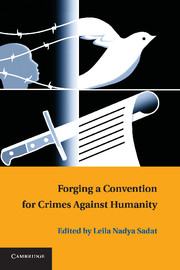Book contents
- Frontmatter
- Contents
- Figures and Maps
- Crimes Against Humanity Initiative: Steering Committee
- Biographies of Contributors
- Foreword
- Preface and Acknowledgments
- Crimes Against Humanity and the Responsibility to Protect
- 1 History of Efforts to Codify Crimes Against Humanity
- 2 The Universal Repression of Crimes Against Humanity before National Jurisdictions
- 3 Revisiting the Architecture of Crimes Against Humanity
- 4 The Bright Red Thread
- 5 Gender-Based Crimes Against Humanity
- 6 “Chapeau Elements” of Crimes Against Humanity in the Jurisprudence of the UN Ad Hoc Tribunals
- 7 The Definition of Crimes Against Humanity and the Question of a “Policy” Element
- 8 Ethnic Cleansing as Euphemism, Metaphor, Criminology, and Law
- 9 Immunities and Amnesties
- 10 Modes of Participation
- 11 Terrorism and Crimes Against Humanity
- 12 Crimes Against Humanity and the International Criminal Court
- 13 Crimes Against Humanity and the Responsibility to Protect
- 14 Re-enforcing Enforcement in a Specialized Convention on Crimes Against Humanity
- 15 Why the World Needs an International Convention on Crimes Against Humanity
- Appendices
- Testimonials and Endorsements
- Index
- References
10 - Modes of Participation
Published online by Cambridge University Press: 01 June 2011
- Frontmatter
- Contents
- Figures and Maps
- Crimes Against Humanity Initiative: Steering Committee
- Biographies of Contributors
- Foreword
- Preface and Acknowledgments
- Crimes Against Humanity and the Responsibility to Protect
- 1 History of Efforts to Codify Crimes Against Humanity
- 2 The Universal Repression of Crimes Against Humanity before National Jurisdictions
- 3 Revisiting the Architecture of Crimes Against Humanity
- 4 The Bright Red Thread
- 5 Gender-Based Crimes Against Humanity
- 6 “Chapeau Elements” of Crimes Against Humanity in the Jurisprudence of the UN Ad Hoc Tribunals
- 7 The Definition of Crimes Against Humanity and the Question of a “Policy” Element
- 8 Ethnic Cleansing as Euphemism, Metaphor, Criminology, and Law
- 9 Immunities and Amnesties
- 10 Modes of Participation
- 11 Terrorism and Crimes Against Humanity
- 12 Crimes Against Humanity and the International Criminal Court
- 13 Crimes Against Humanity and the Responsibility to Protect
- 14 Re-enforcing Enforcement in a Specialized Convention on Crimes Against Humanity
- 15 Why the World Needs an International Convention on Crimes Against Humanity
- Appendices
- Testimonials and Endorsements
- Index
- References
Summary
INTRODUCTION
Violations of international humanitarian law entail what Röling called “system criminality.” Indeed, international crimes such as crimes against humanity often occur on a mass scale or in the context of systemic violence. System criminality generally concerns a plurality of offenders, particularly in carrying out the crimes. It further presupposes an auctor intellectualis, or an “intellectual perpetrator,” pulling the strings. This can be one person, but also a group of people gathered together in a political or military structure. Any international prosecutor will acknowledge that linking those two levels – the intellectual perpetrator at leadership level and the plurality of offenders at execution level – is a difficult task. This chapter will discuss both traditional forms of liability (commission, instigation, and aiding and abetting/complicity) and crime-specific modes of liability. The latter have been conceptualized to punish “intellectual perpetrators” by way of inchoate modes of liability (conspiracy, incitement) or by linking the intellectual and execution levels (indirect perpetration, participation in a criminal enterprise, and superior responsibility).
The problem of linking crimes of foot soldiers to the masterminds is not new. In setting up the International Military Tribunal (IMT) at Nuremberg, U.S. Army Colonel Bernays devised a liability theory based on the concepts of conspiracy and membership in a criminal organization that would enable the conviction of not only the perpetrators of crimes but also their superiors and the thousands of lower-ranking Nazi culprits who had been passive observers. The theory was never fully implemented in practice.
- Type
- Chapter
- Information
- Forging a Convention for Crimes against Humanity , pp. 223 - 261Publisher: Cambridge University PressPrint publication year: 2011
References
- 1
- Cited by



